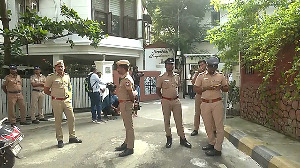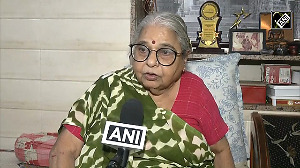Maharashtra Finance Minister Jayant Patil says his party opposes any reduction. Need I add that Shri Patel owes allegiance to the Nationalist Congress Party? Or that he was following in the footsteps of party chief Sharad Pawar, who announced during a press conference at the Indian embassy in Washington, 'If corrective measures were not taken courageously, the oil companies and country's economy will soon come to a halt. It is our responsibility to explain to the people, the background of this decision. I'm confident in the end they will understand.'
I doubt that, Sir, I really do. How will 'the people' understand when even your partners don't? Responding to Jayant Patel, the local Congress spokesman, Hussain Dalwai, shot back, 'He should realise that he represents the entire Maharashtra and not just the sugar lobby... The chief minister has already made it clear that it is not any individual but the state cabinet which is authorised to take the decision. If he or his party has reservations, they can raise them at the meeting.'
Right on cue, Chief Minister Vilasrao Deshmukh ordered his chief secretary and finance secretary to prepare a note for the state cabinet. If the issue hadn't been discussed what was the point of Petroleum Minister Deora's grandstanding before the television cameras?
Put aside the picture of a Maharashtra government so spectacularly at odds with itself; the Nationalist Congress Party actually makes a larger point. Its spokesman Ratnakar Mahajan put it clearly, 'Sales tax is a major source of revenue and is a major component in the state budget. The NCP is all for the state government carefully examining the impact of the waiver of incremental sales tax on petrol and diesel. If the revenue loss is huge, we will oppose the rollback. If it is marginal, the State Cabinet can take an appropriate decision.'
That last sentence is aimed at Congress chief ministers who rushed to reduce taxes. Take Delhi, whose government charges 20 per cent VAT on petrol and 12.5 per cent on diesel -- which adds up to a very healthy figure, approximately Rs 1,450 crore. (Some say Rs 1,500 crore.) Taxing fuel is the single largest source of revenue for the Government of Delhi, far from 'marginal'!
Wherever you live in India, roughly 20 per cent of what you pay at the petrol pumps goes to the state government. Given their horrible fiscal health, I don't see any sensible finance minister reducing taxes. Tamil Nadu Chief Minister M Karunanidhi put it succinctly, 'Cut the sales tax on petrol, and I must raise bus fares.'
If roughly 20 per cent goes to the various state governments, another 30 per cent goes to the Union finance minister. (That figure is probably on the low side but let it stand.) The Union government vacuums the rupees right out of our wallets through a combination of customs and excise duties, along with the education cess.
Petroleum Minister Deora carefully forgot to mention that when the price of petrol is raised, the Government of India gets a heftier chunk of change by way of excise.
Gigantic advertisements have been appearing in various newspapers for several days now. The gist of their message is that the government and the various oil companies are bearing 84 per cent of the cost of increased prices. Given that local and federal taxes account for at least 50 per cent of the price you and I must pay, this is nonsense!
Who is actually making money out of the petrol and diesel business? There are, traditionally, five players, namely the Union government, the state governments, the refineries, the petrol pump operators, and the general public.
The oil companies claim they have suffered losses anywhere between Rs 75,000 crore and Rs 100,000 crore. (The figure varies depending on who is speaking.) Even the enhanced prices, they say, will just cut losses, they are still not making a profit out of them. Every oil industry analyst appears to agree.
What of the petrol pump owner? He has a fixed rate, and raising prices is therefore largely a revenue neutral process for him.
That leaves the 'Aam Aadmi' of Congress legend. He is the one who must ultimately foot the bill. The oil companies in India, please remember, are public sector undertakings. Their losses, in the ultimate analysis, are losses that must be made up by the Indian public at large -- over and above what we pay at the pumps.
What of the government claim that it bears the lion's share of the burden? Gobbledygook! No government, whether federal or local, exists separately from the people. Its losses too must be paid by Indian citizens.
Government spokesmen claim credit for not raising kerosene and cooking gas prices. In the furore over petrol and diesel, few paid attention to another decree. Essentially, it said the oil companies were free to raise prices if the price of crude went over US $75.00 a barrel. At that point, petrol automatically becomes dearer by 39 paise a litre and diesel by 30 paise a litre. (Which wipes out any effect of 'reducing sales tax'!)
Here is the real killer. The Government of India has not excluded kerosene and cooking gas from this exercise. And that is without taking any other taxes into account. Talk about a sneaky way to make money!
What happens if crude prices dip under $75 a barrel? (As I write, the price is around $68.50 per barrel, below the $70 mark that was the immediate excuse for raising prices.) Nothing doing, the prices will remain at their enhanced levels!
The CPI-M's Sitaram Yechury claims that the Manmohan Singh government originally sought to raise kerosene and cooking gas prices along with petrol and diesel. He mentioned a rise of Rs 5 per litre for kerosene and of Rs 100 per cylinder for cooking gas. I have a hunch that he is right, and this so-called freedom of action given to the oil companies is just a way of raising prices through the back-door.
The Union petroleum minister has no authority to reduce customs and excise duties, Finance Minister P Chidambaram's domain. Which brings up an intriguing point -- the silence of the economist prime minister and his capable finance minister. From the horrendous mutation of the 'Saral Tax Form' to the raising of fuel prices, there seems to be a frenzied rush to rake in the money, irrespective of the cost to the 'Aam Aadmi'. What is going on?





